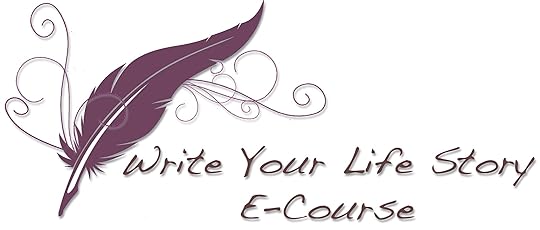Cate Russell-Cole's Blog, page 57
April 30, 2012
Elizabeth Gilbert, Writer of Eat, Pray, Love; on Coping With Creativity
Elizabeth Gilbert is the author of Eat, Pray, Love. This is an address she gave at TED about ways to capture the muse and cope with the emotional rollercoaster that creativity puts us through. She is asking the questions, “What if I don’t succeed? What if my last work was the best I will ever produce?” This will make you think about creativity in directions that may never have occurred to you.

Filed under: Creativity, Food For Thought, Indie Publishing, Inspiration, Writer's Recovery Community Post, Writing Tagged: anxiety, create, creativity, discovery, divine, Eat Pray Love, Elizabeth Gilbert, failure, fear, goals, ideas, inspiration, muse, success, writer, writing








April 23, 2012
Remembering Our Heroes
They shall grow not old, as we that are left grow old;
Age shall not weary them, nor the years condemn.
At the going down of the sun and in the morning
We will remember them.

The Rising Sun Army Badge
In Australia on April 25th it’s Anzac Day. ANZAC stands for Australian and New Zealand Army Corps. The day is held on the anniversary of a landing on the shores of Gallipoli, Turkey during World War I, 1915.
Not only are our military forces from World War I remembered on ANZAC Day, we also remember all who have served and died for our country. As our Australian War Memorial says, “The spirit of ANZAC, with its human qualities of courage, mateship, and sacrifice, continues to have meaning and relevance for our sense of national identity.”
There is a great deal of debate as to whether the ANZACS landed at the correct spot in Turkey. The terrain was almost impossible to scale; there was little shelter from enemy gunfire and the campaign ended in massacre. More than 87,000 Turkish soldiers and 44,000 Allied soldiers lost their lives; including 8,700 Australians and 2,721 New Zealanders. After ten months, retreat was ordered under the cover of night. Fortunately, no more soldiers were wounded or killed in during the evacuation.
From a soldier who landed at Gallipoli:
On Tuesday [27 April] the Turks made a very determined attack against our left flank and we were standing to arms all day with bayonets fixed awaiting the charge which never came. At night the Turks did everything imaginable to raise their courage, blowing bugles, shouting “Allah” and shooting like Hell. We naturally expected every minute to be called upon to get to work with the bayonet. Every few minutes the cry rang out “Supports ready to charge” and up we rush, revolvers drawn and bayonets gleaming in the moonlight and one continuous rattle of musketry and machine guns. It was a nerve-wracking night, the tension broken every now and then by the orders “Stretcher-bearers wanted on the right or left” or “Another machine gun wanted”. But the longest night must come to an end and every man seemed to heave a sigh of relief when the grey dawn spread over the sky and showed us that, although by a hot fire we had held our position, the still forms of Australia’s manhood and the stream of stretchers making towards the clearing hospital on the beach, our name had been made with heavy casualties. [Captain I S Margetts, Diary, 27 April 1915] Source: © 2012 Copyright Board of Studies NSW
ANZAC Day is marked with ceremonies at dawn, the playing of the Last Post and it is a public holiday. Pubs are not allowed to open until after the ceremony. It is the only day of the year when the traditional gambling game of “Two Up” is allowed to be played (below). en.wikipedia.org/wiki/Two-up
In school, every year, we were told the story of Simpson and his donkey. Jack Simpson was a stretcher bearer who was at ANZAC Cove, Gallipoli, carrying wounded men off the battlefield with his donkey. He rescued over three hundred men under constant bombardment from enemy fire, until he was hit by a machine gun in the line of duty. He was nominated for a Victoria Cross and the highest military honours in Australia.
I hate the idea of war of any kind, however, I am deeply grateful for and respectful of our military personnel who have always and still play, an important part in keeping our nation at peace.

A Two Up Set With Two Pennies In It
Filed under: Personal Post








April 19, 2012
May Writing Events Around the Globe
May seems to be a popular month for anyone with a love of reading and writing. No matter what hemisphere you’re in, here are events you can get involved in by continent. This is not a complete list, to stay in the loop on what’s on and where, you can also follow Literary Festivals all year around on:
Facebook: http://www.facebook.com/pages/Literary-Festivals/220278624651569
Twitter:
Or my Writer’s Festivals list on Twitter: http://twitter.com/#!/cateartios/writer-s-festivals
Australian and New Zealand festivals are listed in detail at: http://www.literaryfestivals.com.au/
Online:
 Story A Day: Write a story every day in May. StoryADay.org is home to an annual Extreme Writing Challenge. “Sick of starting and never finishing writing projects?…” This was started in 2010. “Some people decided to write on weekdays only, some declared they would sketch a story idea every day, some weren’t sure what they could manage anything, but just the idea of committing to this hare-brained scheme with a bunch of other writers had got them so excited they couldn’t resist.” Twitter hash tag #storyaday http://storyaday.org
Story A Day: Write a story every day in May. StoryADay.org is home to an annual Extreme Writing Challenge. “Sick of starting and never finishing writing projects?…” This was started in 2010. “Some people decided to write on weekdays only, some declared they would sketch a story idea every day, some weren’t sure what they could manage anything, but just the idea of committing to this hare-brained scheme with a bunch of other writers had got them so excited they couldn’t resist.” Twitter hash tag #storyaday http://storyaday.org
Australia:
Sydney Writer’s Festival, May 14-20 http://www.swf.org.au/ Twitter: @SydWritersFest “Sydney Writers’ Festival is Australia’s largest annual celebration of literature and ideas. Each year, we present over 300 events (half of them for free) and attract attendances of around 80,000 in venues that stretch from the Festival hub at Walsh Bay to the Blue Mountains. For one week every May we bring together authors of the very best contemporary fiction and writers of cutting edge nonfiction, including some of the world’s leading public intellectuals, scientists and journalists. With the finest literary writing at our core, our programming is driven by the ideas and issues that animate all forms of writing.”
 Melbourne: The Emerging Writer’s Festival, this one is for writers and isn’t just reader based. “The Emerging Writers’ Festival is an independent arts organisation based in Melbourne’s Wheeler Centre for Books, Writing and Ideas. We exist in order to promote the interests of emerging writers – to improve their opportunities for professional development as well as their engagement with the broader public. Each year the Emerging Writers’ Festival brings writers, editors, publishers and literary performers together with the reading public for a festival that is fast becoming an essential part of Australia’s literary calendar.” http://www.emergingwritersfestival.org.au/about-ewf/ Twitter: @EmergingWriters
Melbourne: The Emerging Writer’s Festival, this one is for writers and isn’t just reader based. “The Emerging Writers’ Festival is an independent arts organisation based in Melbourne’s Wheeler Centre for Books, Writing and Ideas. We exist in order to promote the interests of emerging writers – to improve their opportunities for professional development as well as their engagement with the broader public. Each year the Emerging Writers’ Festival brings writers, editors, publishers and literary performers together with the reading public for a festival that is fast becoming an essential part of Australia’s literary calendar.” http://www.emergingwritersfestival.org.au/about-ewf/ Twitter: @EmergingWriters
 The Emerging Writer’s Festival is promoting if:book Australia, “if:book Australia promotes new forms of digital literature and explores ways to boost connections between writers and audiences. if:book Australia is led by author, editor and digital experimenter, Simon Groth. if:book Australia promotes new forms of digital literature and explores ways to boost connections between writers and audiences. if:book Australia is a small think-tank that is part of the Queensland Writers Centre.” Find them on Facebook: http://www.facebook.com/futureofthebookau ” They also have a Twitter feed.
The Emerging Writer’s Festival is promoting if:book Australia, “if:book Australia promotes new forms of digital literature and explores ways to boost connections between writers and audiences. if:book Australia is led by author, editor and digital experimenter, Simon Groth. if:book Australia promotes new forms of digital literature and explores ways to boost connections between writers and audiences. if:book Australia is a small think-tank that is part of the Queensland Writers Centre.” Find them on Facebook: http://www.facebook.com/futureofthebookau ” They also have a Twitter feed.
International:
if:book is linked with an International fellowship of organisations exploring book futures, including the Institute for the Future of the Book in New York, if:book London, and if:lire in Paris.
United States and Canada:
 Book Expo America is on from June 4-7 (yes, I know this is a May post, but this one needs plenty of notice.) Held in New York City, this event hosts a conference, special events, Author events and autographing, BlogWorld and a New Media Expo NY. Details are on Pinterest, Facebook, Twitter and Youtube. http://www.bookexpoamerica.com/ It’s huge by the looks.
Book Expo America is on from June 4-7 (yes, I know this is a May post, but this one needs plenty of notice.) Held in New York City, this event hosts a conference, special events, Author events and autographing, BlogWorld and a New Media Expo NY. Details are on Pinterest, Facebook, Twitter and Youtube. http://www.bookexpoamerica.com/ It’s huge by the looks.
The Ontario Writer’s Conference is being held on May 5. They have a festival of Authors on the Friday night, workshops and you can find all the information here: http://www.thewritersconference.com/
Oregon are having a Writing Festival on May 5th at Portland State University. http://www.octe.org/events_oregonwritingfestival.html This is a great initiative for writing teachers which accents writing as a craft for grades 4-12; recognises students excellence and teacher excellence; plus has some great speakers such as Bart King. Looking at the site, he has authored “The Pocket Guide to Brilliance” and “The Big Book of Gross Stuff.” As a writing teacher, although I teach adults, I am encouraged to see events like this. There should be moer of them.
 If Science Fiction and Fantasy is your genre, the Science Fiction and Fantasy Writers of America are hosting their Forty-Seventh Nebula Awards Weekend will be held Thursday through Sunday, May 17 to May 20, 2012 in Arlington, Virginia. There are speakers, a banquet, workshops, discussion panels and autograph signings. Places are limited.
If Science Fiction and Fantasy is your genre, the Science Fiction and Fantasy Writers of America are hosting their Forty-Seventh Nebula Awards Weekend will be held Thursday through Sunday, May 17 to May 20, 2012 in Arlington, Virginia. There are speakers, a banquet, workshops, discussion panels and autograph signings. Places are limited.
MorningStar Intensive Christian Writer’s Seminar, May 3 -5 http://www.morningstarministries.org/events/morningstar-conferences/may-writers-seminar
New Zealand:
 Auckland Writer’s and Reader’s Festival, May 9-13 http://www.writersfestival.co.nz/ ”A festival of literature and ideas, bringing together acclaimed writers, readers and thinkers through innovative programming.” Twitter: http://twitter.com/#!/AklWritersFest/ The Auckland Writers & Readers Festival is delighted to announce that former spy chief Dame Stella Rimington (UK), Booker Prize winner Roddy Doyle (Ireland) and beloved Young Adult writer Emily Rodda (Australia) will attend the May 2012 Auckland Writers & Readers Festival.
Auckland Writer’s and Reader’s Festival, May 9-13 http://www.writersfestival.co.nz/ ”A festival of literature and ideas, bringing together acclaimed writers, readers and thinkers through innovative programming.” Twitter: http://twitter.com/#!/AklWritersFest/ The Auckland Writers & Readers Festival is delighted to announce that former spy chief Dame Stella Rimington (UK), Booker Prize winner Roddy Doyle (Ireland) and beloved Young Adult writer Emily Rodda (Australia) will attend the May 2012 Auckland Writers & Readers Festival.
United Kingdom:
Most U.K. festivals appear to be held in between April and July. For a comprehensive listing, please visit http://www.literaryfestivals.co.uk/index.html#.T2wod5ggt5g
Throughout the U.K. May 16 is National Flash Fiction Day. The Lancashire Writing Hub site says ”Flash fiction is a style of fictional literature or fiction of extreme brevity. There is no widely accepted definition of how long Flash Fiction should be. The name is believed to have been first used in 1992 as the title to an anthology of very short stories. Some markets for flash fiction impose caps as low as six words and others can go up to as many as a thousand words. Hemmingway famously wrote a story in six words: ‘For Sale: baby shoes, never worn.’ Recently, with the growth of the internet, more people reading on e-Readers and mobile phones, and the sheer pace of life, the very short story has taken on a life of its own, a life that Nation Flash Fiction Day is celebrating.”
I have to admit my knowledge of British geography is non existent. If you are in Lancashire, the information for their day (great web site, they seem to have a lot of good things happening) is here: http://www.lancashirewritinghub.co.uk/2012/02/national-flash-fiction-day-16th-may-2012/ If you don’t live in that area, Google “National Flash Fiction Day” and see what is available close to where you are. Or, you could start something yourself, in a flash. Yes, that was a terrible pun wasn’t it.
Filed under: Blogging, Indie Publishing, Resources, Writing Tagged: Australia, author, autograph, banquet, BlogWorld, book signing, books, conference, Emerging Writers Festival, event, expo, festival, literature, National Flash Fiction Day, Nebula Awards, panel, reading, special events, Sydney Writers Festival, teacher, Twitter, weekend, workshop, writers festival








April 16, 2012
Sending Your Characters Into Shock
This post is in the process of being collated into an e-book, “Building Emotionally Realistic Characters” (Book Two of the Four Dimensional Characterisation Series.) It will be available in Kindle, Nook and iBook form before the end of May 2012. For further information, please keep an eye on this blog.
You are writing about the scene of a car crash. There is mangled metal, the Police and Paramedics are in attendance; but where is the driver of the car? Several blocks away, a dazed woman with blood on her forehead is wandering around, muttering about buying tissues. She doesn’t know what just happened. You are writing about a character who is experiencing psychological shock. This post is a basic introduction to psychological shock which will help you understand it, so you can use it effectively in your writing.
There are two types of shock. The first is the medical type which is a life threatening, sudden drop in the body’s blood pressure. It’s common in serious illness or injuries. That is not what I am referring to here. Though if you want to write about it, basic information can be found here on Medicinenet.
Psychological shock is an acute stress reaction which people are thrust into because of a sudden trauma, such as a car accident; death of a loved one; becoming a victim of crime; being caught in a natural disaster: any incident which causes distress by way of inducing fear, emotional pain or severe mental stress. As a writer, if you have taken your character/s through an experience which would trigger shock, how they react to the shock over time, can be woven into your plot and character development.
Shock is actually not the correct clinical term. Mental health professionals refer to it as ‘acute distress disorder.’ If it doesn’t resolve itself within four weeks of the event, it can become a long-term, crippling psychological problem. Once it becomes a chronic problem, shock may evolve into a serious anxiety disorder such as clinical depression, or post traumatic stress disorder.
 How people react to serious incidents depends on the actual person. Not everyone experiences a profound reaction. Some will respond with a fight or flight response where they are hyped up and prepared to survive in any way they can. Some people look for a rescuer so they don’t have to deal with the situation. Others can shut down, not knowing how to cope. In very simple terms, the emotions go into overload and the subconscious mind decides that the best way to cope is to deal with it later, or not at all. They are experiencing helplessness and unconsciously, they decide that running or fighting is simply useless. It is a reaction, not an action.
How people react to serious incidents depends on the actual person. Not everyone experiences a profound reaction. Some will respond with a fight or flight response where they are hyped up and prepared to survive in any way they can. Some people look for a rescuer so they don’t have to deal with the situation. Others can shut down, not knowing how to cope. In very simple terms, the emotions go into overload and the subconscious mind decides that the best way to cope is to deal with it later, or not at all. They are experiencing helplessness and unconsciously, they decide that running or fighting is simply useless. It is a reaction, not an action.
Someone with resilience; high self-esteem; a survival mentality; or who is used to taking a leadership role, is more likely to experience a fight or flight response. However, if they are ill, burnt out, discouraged, fatigued or the trauma is outside of their experience to the point where they have no idea how to act, they may slip into this state. That may provide you with an Achilles heel or strong character contrast which you can use to expand the reader’s understanding of the character.
Psychological shock can show up as a series of physical symptoms as well as mental ones. It may involve:
Feeling confused;
Numbness and detachment from people and surroundings;
Inability to remember the traumatic event which has occurred, or only remembering hazy details;
Some people may become agitated and overactive; and
Inability to make decisions, at times even simple ones; and
Impaired judgement.
Longer term symptoms can include:
Sleep disturbances;
Negative changes in the person’s normal mood;
Avoidance of memory triggers;
Flashbacks (please read this article, it’s excellent http://www.pete-walker.com/flashbackManagement.htm);
Nightmares.
Flashbacks and nightmares serve to bring back the traumatic memories that the mind just doesn’t want to address. It is an internal healing mechanism that can be used to move the character out of trauma and into growth. Acknowledging their content and dealing with the underlying trauma has been seen to reduce flashbacks and nightmares. Continuing to push what happened away, may trap people in a cycle of mental horror.
As this is a broad and technical topic, a number of links have been embedded in this post to give you the information you need. So please, click on the red text to explore the area more fully. I could continue to write about panic attacks and other related issues, but the more you read, the more prompts your discovery will give you. As I have been saying in all these psychology based posts, if your comprehension of the way these emotional states work is accurate, you will write a work of fiction that is realistic and doesn’t take improbable shortcuts to a picture perfect ending. That adds credibility to your work which will foster your success as an author. Good luck.
NOTE: Please realise that this post is a very brief, non clinical introduction to the topic of psychological shock. It is in no way meant to be used as advice or guidance in how to get through any shock you have had or are now experiencing. No liability will be accepted for your use of this material for any purpose, or any of the material on the linked web sites. Please consider what you read carefully, seek professional help and make up your own mind. Thank you.
The crash photo in this post is paid for and licenced to me. It is Copywritten. You may not save it or use it for your own purposes. You can purchase it from iStockphoto.com This article is Copyright Cate Russell-Cole 2012. All rights reserved. It may not be reproduced in any medium, in print or digital format. I regularly search for my articles and have found where they have been used without permission. Action will be taken against offenders.
Filed under: Food For Thought, Indie Publishing, Inspiration, Resources, Writing Tagged: accident, anxiety disorders, brain, characterisation, depression, filter, flashbacks, mind, nightmares, plot, post traumatic stress disorder, psychological shock, psychology, shock, stress, subconscious, thinking, trauma, trigger, writer, writing








April 11, 2012
Other Original Ways of Representing Your Life
In the Internet era we tell our life stories in so many different ways: through Facebook status entries, tweets, blogs and personal web pages. All these can be added to your autobiography as a snapshot of what you were doing at the time; how you were feeling and what was happening in the world around you.
However, there are many more ways than words to communicate your life story, or that of your ancestors. If you are into family history, you may have come across story quilts. Here is an example.
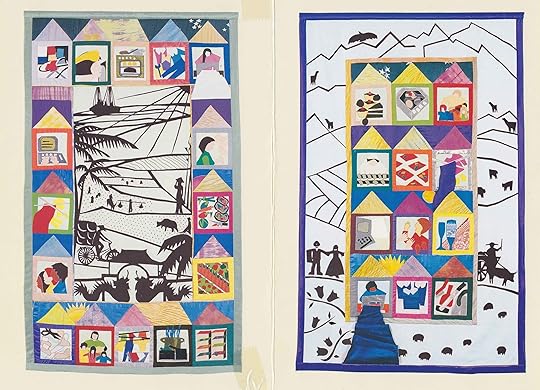
These particular quilts are from a project named “Stitching the Stories 2000.” The back of the card reads, “Two quilted wallhangings depicting women’s experience of paid home based work. Highlighted is the impact of work related issues on these workers and their families. The hangings were made by women from mainly Vietnamese and Spanish speaking communities.”
You may have family treasures such as these you can photograph and add to your family history. Any paintings, art or crafts of any kind can be placed in with your genealogical information to give that person life and a chance to “speak” in their own words.
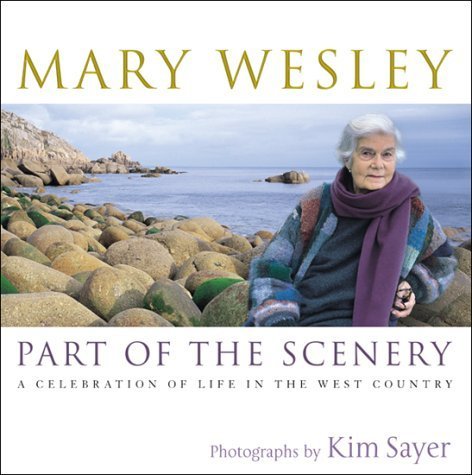 Family stories and autobiographies don’t have to be serious, wordy books. Fiction author Mary Wesley published a beautiful coffee table book which was autobiographical. Mary’s novels are based around Cornwall where she grew up.
Family stories and autobiographies don’t have to be serious, wordy books. Fiction author Mary Wesley published a beautiful coffee table book which was autobiographical. Mary’s novels are based around Cornwall where she grew up.
This book places together stunning two page colour photos of the scenery in the area, with very short pieces of writing about her life. If you don’t want to write pages and pages, but just want to get the essence across, this is an inspirational idea. It produces an easy to read, personal treasure.
Brainstorm some ideas on alternative approaches you can take to your family history or autobiography to make it original, colourful and attractive to read. Think outside the ordinary and make it representational of who you are, or a theme that has run through your family, if there happens to be one. I’d love to hear your ideas. Please post them in the comments.
This post is an excerpt from the Write Your Life Story E-Course. For more information on the course, please click on the E-Courses link above, or visit http://www.virtual-desk.com.au/trainer.html
The Story Quilt artists are Elaine Gardner, Lynn Elzinga-Henry, Cindy South Czabania and the design is by Yvonne Nowland. The card is published by the Working Women’s Centre South Australia Incorporated.
This article is Copyright Cate Russell-Cole 2012. It may only be reproduced, with my permission, for non commercial purposes only. My name and Copyright must remain intact. For permission, please email me at: cate@virtual-desk.com.au
Filed under: Creativity, Inspiration, Write Your Life Story E-Course, Writing Tagged: autobiography, biography, creativity, e-course, e-learning, family history, inspiration, journal, journaling, learning, life story, Mary Wesley, resource, story quilt, study, writer, writing








April 9, 2012
The Rewards of Being A Memoir Writing Teacher
 If you were to ask me what the greatest lesson I have learned from teaching memoir writing is, I would say I have learnt there is no such thing as an average housewife, or a boring person. Some stories are more spectacular than others, but everyone has one you can be inspired by, marvel at and wonder how you’d cope in the same position.
If you were to ask me what the greatest lesson I have learned from teaching memoir writing is, I would say I have learnt there is no such thing as an average housewife, or a boring person. Some stories are more spectacular than others, but everyone has one you can be inspired by, marvel at and wonder how you’d cope in the same position.
The one story that sticks firmly in my mind was in an introductory class where everyone was sharing why they were there. One lady said she wanted to write the story of her father who had been a pilot in the first World War. He had made aerial food drops to a town in Poland. Another lady spoke up and asked, “what town?” It turned out to be the town where she’d lived as a small child. They were surrounded by the Nazi’s and starving. That pilot’s efforts, kept that child and her family alive. There wasn’t a dry eye in the room and those two ladies will be friends for life. That was in a medium sized city on the other side of the world… In teaching memoir, anything can happen!
I’ve taught a number of different courses over the years, from conflict resolution and communication skills, to word processing. After a time I find I get restless. I keep hearing my voice churning out the same words in the same order, again and again and again. I get sick of the sound of my voice! I have noticed I never get tired of the sound of other’s voices though. I remember the story of the Irish housewife whose deadbeat husband just walked out one day and never came back. That was in the 1960s where women had no real independence. She went to the bank and power company and made deals with them so she could pay her bills. She got a job, she kept the roof over her children’s heads. In those days that was daring! As she told the story, she was shaking. The glimpse we had into the courage it took her to do that shook us all. She would be described as an ‘ordinary housewife’ now. Not even close… She was a champion!
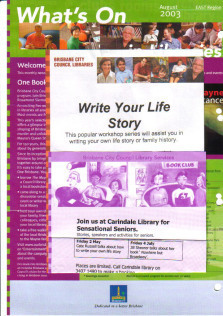 I have heard stories of tragedy that made me cry; I’ve heard magical stories of childhood that had the whole class enthralled. Those stories bring back so many precious memories of our own that we’d forgotten! If someone hadn’t shared, we’d never think of those things. This is why I love to teach: to see people inspired. I enjoy watching faces light up, as students discover they can write and it brings them joy. The dark stories have to come with the light, but there are ways to cope with them. There was my favourite lady who was ‘dangerously close to ninety,’ who always turned up in the same outfit and told the funniest, most outrageous stories. She had survived a husband with a mental illness who often fired blank bullets under their house to try and intimidate her. She left him; then when he was dying of cancer, took him back and nursed him until he died. She said his illness wasn’t his fault. She was a far better person than I will ever be. She was also a victorious survivor.
I have heard stories of tragedy that made me cry; I’ve heard magical stories of childhood that had the whole class enthralled. Those stories bring back so many precious memories of our own that we’d forgotten! If someone hadn’t shared, we’d never think of those things. This is why I love to teach: to see people inspired. I enjoy watching faces light up, as students discover they can write and it brings them joy. The dark stories have to come with the light, but there are ways to cope with them. There was my favourite lady who was ‘dangerously close to ninety,’ who always turned up in the same outfit and told the funniest, most outrageous stories. She had survived a husband with a mental illness who often fired blank bullets under their house to try and intimidate her. She left him; then when he was dying of cancer, took him back and nursed him until he died. She said his illness wasn’t his fault. She was a far better person than I will ever be. She was also a victorious survivor.
Stories have value. The most mundane one you have, is not mundane to someone who needs to hear it. We all have treasures to immortalise in writing for the family members we have now, and to come. Writing down your story is important and it is still my joy to be able to teach this course to help you on the path forwards. If you would like details of my E-Course on writing your life story they are below. Take the time to write your story! It will bring you sorrow, joy, laughter and greatly improve your writing skills. It’s been the best career journey I’ve taken. It would be my pleasure to have you join me.
Course Outline:
 Whether you want to write a journal or an autobiography, the Write Your Life Story E-Course will give you a structure for what you want to write; many ideas to get you started and enthusiastic; and an understanding of new techniques to bring back memories and write a vibrant story.
Whether you want to write a journal or an autobiography, the Write Your Life Story E-Course will give you a structure for what you want to write; many ideas to get you started and enthusiastic; and an understanding of new techniques to bring back memories and write a vibrant story.
By the end of the course you will have:
• Constructed a time line of your life’s events as a starting point for writing;
• Chosen a title;
• Planned what resources you need such as cost and research;
• Used memory trigger techniques and mind mapping;
• Decided which parts of your life you do and don’t want to write about;
• Knowledge about which biography writing pitfalls to avoid;
• Used basic fiction writing techniques to add colour and depth to your work;
• Have a list of resources for inspiration and further information;
• Organised your work so nothing is lost.
If you would like a sample of what the E-course is like, please visit this link: http://www.virtual-desk.com.au/WYLS%20eCourse%20Week%201.pdf
Student Feedback:
 Bev: “I have really enjoyed completing the exercises. Numerous long forgotten memories, many happy and many painfully sad, have arisen… I have downloaded many of the items, documents etc, and have made a reference folder. I have culled the mountains of papers that I was hanging onto and set up my study for easy access to notes, journals etc… The course has also made me rethink how I am going to complete my Dad’s Story… It has also given me other ideas to consider. I believe the course has provided the tools and resources to assist me to make better judgements regarding these potential changes. Finally the course has given me the motivation and courage to complete the story I started just after my Dad’s death. I used to worry that I was putting to much emotion into my writing and that I would bore people to death, but I have learnt that this is okay, this is how my life experiences have moulded me. Each week I have loved reading everyone’s work… Also thank you Cate for your guidance and encouragement.”
Bev: “I have really enjoyed completing the exercises. Numerous long forgotten memories, many happy and many painfully sad, have arisen… I have downloaded many of the items, documents etc, and have made a reference folder. I have culled the mountains of papers that I was hanging onto and set up my study for easy access to notes, journals etc… The course has also made me rethink how I am going to complete my Dad’s Story… It has also given me other ideas to consider. I believe the course has provided the tools and resources to assist me to make better judgements regarding these potential changes. Finally the course has given me the motivation and courage to complete the story I started just after my Dad’s death. I used to worry that I was putting to much emotion into my writing and that I would bore people to death, but I have learnt that this is okay, this is how my life experiences have moulded me. Each week I have loved reading everyone’s work… Also thank you Cate for your guidance and encouragement.”
Megan: “I took an online course in autobiography and journalling… and I have my first e-book published! Don’t Mind Me is published by Chipmunka www.chipmunkapublishing.co.uk and will soon be a paperback too. I tell my story, of my dysfunctional childhood, my abusive first marriage, my experience of rape and domestic violence, my descent into psychosis and my extraordinary recovery… The e-book is still no 8 in the top 10 of 380 e-books and I hope the paperback won’t be too long now.” (March 2008)
Course Cost
 The course fee is $250.00 AU with a year’s tutoring or $5.99 AU without tutoring, payable through www.paypal.com.** The E-Course is available by email in a .pdf e-book format with additional worksheets (3MB in total) or I can post you the course CD-Rom. Tutoring services cover a year from the date payment is received. It does not include manuscript editing services, promotion, recommendations to publishers, writing query letters, technical formatting of a manuscript or any aspect of the publishing process. It includes feedback on your writing and course exercises; discussion of the course material, approaches you can take in your work and technical assistance on any aspect of the course.
The course fee is $250.00 AU with a year’s tutoring or $5.99 AU without tutoring, payable through www.paypal.com.** The E-Course is available by email in a .pdf e-book format with additional worksheets (3MB in total) or I can post you the course CD-Rom. Tutoring services cover a year from the date payment is received. It does not include manuscript editing services, promotion, recommendations to publishers, writing query letters, technical formatting of a manuscript or any aspect of the publishing process. It includes feedback on your writing and course exercises; discussion of the course material, approaches you can take in your work and technical assistance on any aspect of the course.
** You don’t have to be a Paypal member to use this service. It is secure, available worldwide and offers buyer protection. The address you send the payment to is lifestory@virtual-desk.com.au It is a very simple process that will cost you nothing extra. If you order the CD please email me your mailing address to the same email address.
Join Our Facebook Community
 You are also most welcome to become a part of the Write Your Life Story Facebook Community. It’s aim is to inspire you to write and improve as a writer, by regularly sharing resources and helpful ‘how-to’ posts on Facebook. The page address is: http://www.facebook.com/pages/Write-Your-Life-Story/173393852705651?sk=app_190322544333196
You are also most welcome to become a part of the Write Your Life Story Facebook Community. It’s aim is to inspire you to write and improve as a writer, by regularly sharing resources and helpful ‘how-to’ posts on Facebook. The page address is: http://www.facebook.com/pages/Write-Your-Life-Story/173393852705651?sk=app_190322544333196
If you have any questions, please don’t hesitate to contact me.
Except for the Paypal and Facebook logos and library flier, the photos in this post are paid for and licenced to me. They are Copywritten. You may not save them or use them for your own purposes. You can purchase them from iStockphoto.com This article is Copyright Cate Russell-Cole 2012. It may only be reproduced, with my permission, for non commercial purposes only. My name and Copyright must remain intact. For permission, please email me at: cate@virtual-desk.com.au I regularly search for my articles and have found where they have been used without permission. Action will be taken against offenders.
Filed under: Creativity, Food For Thought, Inspiration, Journalling, Resources, Write Your Life Story E-Course, Writing Tagged: autobiography, biography, creativity, e-course, e-learning, family history, inspiration, journal, journaling, learning, life story, resource, study, writer, writing








April 2, 2012
How to Fuel Conflicts and Misunderstandings in Plots

Image Copyright www.photos8.com
This post is in the process of being collated into an e-book, “Building Emotionally Realistic Characters” (Book Two of the Four Dimensional Characterisation Series.) It will be available in Kindle, Nook and iBook form before the end of July 2012. For further information, please keep an eye on this blog.
Have you ever seen a misunderstanding in a film or book and thought, “if only they’d said it this way, that would never have happened!” As a fiction writer, plot twists need to be built into story lines. One way to enable setbacks in a story is to build in miscommunication between the characters. That can be easy to write, however, if you want to create a realistic relationship that isn’t too simplistic to engage the reader, you can use the more subtle basics of interpersonal communication to move the story towards your desired destination.
For a start, characters need to understand what is being said to them. Simple? Not when you consider the filters that communication may go through before it’s interpreted in someone else’s head. Filters can include:
Whether all parties are speaking in their native language.
Differences in level of education: is one character more highly educated and using unfamiliar or deliberately fancy or specialised terms?
Age differences and differing maturity levels which can mean acceptable words, cultural nuances or trends such as dress are offensive or not understood. Or an adult trying to speak at a child’s level and vice versa.
The effects of alertness or lack of, due to sleep, health, temperature in the setting, medications, drugs etc.
Cultural differences in how words are used, tone of voice and eye contact.
Differences in moral values.
Expectations based on whether the other party is of lower rank / importance or higher. Are they equal, fighting for equality, or in a leader – subservient relationship? Do both parties see it the same way?
Non verbal communication such as posture, pacing or still, tone of voice, raised eyebrows, gestures showing love or anger etc.
Perceived motivational factors: is that person out to get me, on my side or not worth my time? Should I listen carefully or who cares what they are saying?
The strength or weakness of the underlying relationship and level trust and familiarity. Is it love or hate?
Expectations of the other’s ability to understand or follow a course of action; which may or may not be realistic.
That person’s hopes and dreams they are trying to accomplish, which are subtly pushing forward what they want.
Sensory stimuli such as offensive smells, overly bright or dim light, background noise or vibrations. For example, ever tried to communicate in an earthquake with a burst sewer pipe next to you and no lighting? You get distracted.
 These kinds of filters work for both parties. When someone is about to say something, what comes out of their mouth goes through their individual filters first. They’re then interpreted by the receiver/s through their filters. So much can go wrong!
These kinds of filters work for both parties. When someone is about to say something, what comes out of their mouth goes through their individual filters first. They’re then interpreted by the receiver/s through their filters. So much can go wrong!
The quickest way to make simple messages go awry is to be vague. In counselling, you are trained to encourage clients to be very specific about what they are saying. You clarify “I feel bad” as hurt, rejected, tired or misunderstood. Staying vague easily leads to people getting the wrong idea.
The level of misunderstanding can have different strengths too. It can be an awkward moment where what is said just leaves the character feeling a bit uncomfortable, but it’s no big deal. Well, at least not until that moment is built on by more awkward moments… If you really want the stress level to be elevated, it can be a situation which creates serious tension, has destructive ramifications and which leads, inevitably, to a crisis which must be addressed. You can start with small issues to lead up to the climax in your story. Let the distrust, hurt and animosity slowly grow. Alternatively, in a positive setting, you can use the same principles to slowly gain trust, allow bonding and have the characters working together cohesively against a common enemy.
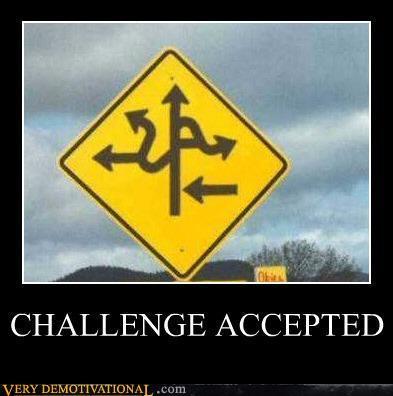 Have a look around you at the plot techniques you see used in books, movies and on television. Also have a look at how you see the people in your life acting which moves them forward or slides them backwards into a poor behaviour patterns. The trick of learning about how human behaviour functions is to be an observer. Sometimes the obvious to others is a complete mystery to someone who is fearful, hurting, tired or confused. As an author, you can subtly or overtly manoeuvre what is said and interpreted in any way you please. The possibilities are limitless.
Have a look around you at the plot techniques you see used in books, movies and on television. Also have a look at how you see the people in your life acting which moves them forward or slides them backwards into a poor behaviour patterns. The trick of learning about how human behaviour functions is to be an observer. Sometimes the obvious to others is a complete mystery to someone who is fearful, hurting, tired or confused. As an author, you can subtly or overtly manoeuvre what is said and interpreted in any way you please. The possibilities are limitless.

Photo at the top of this post is Copyright http://www.photos8.com
This article is Copyright Cate Russell-Cole 2012. All rights reserved. It may not be reproduced in any medium, in print or digital format. I regularly search for my articles and have found where they have been used without permission. Action will be taken against offenders.
Filed under: Creativity, Indie Publishing, Inspiration, Resources, Writing Tagged: argument, body language, character, characterisation, communication, communication shutdown, conflict, culture, education, hate, Indie publishing, inspiration, love, misinterpretation, misunderstanding, motivation, plot, plot twist, power, psychology, relationships, resource, writer, writing








March 18, 2012
Phoenix Rising: Stressed Writer’s Community
 I’ve worked with writers for a long time. It saddens me when I hear stories of how they have left writing groups or walked out of conferences due to harsh criticism and snobbery. One of my goals for this year was to build a friendly writers group for all genres of writers who want to meet new people or who have been hurt by negative feedback, hostility and jealousy.
I’ve worked with writers for a long time. It saddens me when I hear stories of how they have left writing groups or walked out of conferences due to harsh criticism and snobbery. One of my goals for this year was to build a friendly writers group for all genres of writers who want to meet new people or who have been hurt by negative feedback, hostility and jealousy.
Being a writer is a tough road as you face the inevitable ups and downs of failures, rejection letters and time constraints. We need each other. So I have built a Google Plus for writers who are stressed, exhausted or burnt out! I love the idea of rising from the ashes and above and away from the fire. The aim of the community is to foster growth, support and healing… plus to have a good laugh. Humour is always welcome, it’s a brilliant fire extinguisher!
If you need encouragement, common sense wisdom, or a bucketload of helpful resources, join us and let’s support each other. The community lives here: http://tinyurl.com/84wxqcw If you would like an invitation to join Google + email me at cate@virtual-desk.com.au and I will send you one. I need your email to do so.
 Comments are welcome and please also email me resources I can share with everyone. Check the links on our profile page and you will see also the link to our board on Pinterest. http://pinterest.com/cateartios/phoenix-rising-stressed-writer-s-community/
Comments are welcome and please also email me resources I can share with everyone. Check the links on our profile page and you will see also the link to our board on Pinterest. http://pinterest.com/cateartios/phoenix-rising-stressed-writer-s-community/

If you are a Twitter user and want to keep up with other members of the community or discuss related issues, the Twitter hashtag is #writerG+ Just do a search for it. The tags also work for Google Plus searches too.
Cheers everyone! Cate
Filed under: Blogging, Indie Publishing, Inspiration, Journalling, Resources, Writer's Recovery Community Post, Writing Tagged: blog, blogger, bloggers, burn out, community, criticism, depression, discouragement, failure, fiction, G+, Google Plus, group, growth, Indie publisher, inspiration, problem solving, recovery, resource, resources, stress management, success, support, writer, writing








March 12, 2012
Thinking Before Your Box’s Time
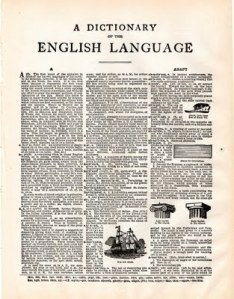 One of the reference sources I have on my desk is an old dictionary. It is so old, the pages aren’t yellowed, they are brown. I can’t find a printing year on it, but it boasts that it is a Home dictionary that is “a book of general reference, pronunciation, etymology, explanation, phrases, synonyms and appendices.” It has no less than eight coloured and 570 black and white illustrations, plus right in the back it has a very handy reference as to the “formal modes of addressing persons of title etc.” This includes Baronets and Knights, who obviously, I bump into often. Plus how to address the Royal Family and Bishops Suffragan. Sorry, what?
One of the reference sources I have on my desk is an old dictionary. It is so old, the pages aren’t yellowed, they are brown. I can’t find a printing year on it, but it boasts that it is a Home dictionary that is “a book of general reference, pronunciation, etymology, explanation, phrases, synonyms and appendices.” It has no less than eight coloured and 570 black and white illustrations, plus right in the back it has a very handy reference as to the “formal modes of addressing persons of title etc.” This includes Baronets and Knights, who obviously, I bump into often. Plus how to address the Royal Family and Bishops Suffragan. Sorry, what?
Does this book sound too quaint to be useful? I believe that my learned colleagues at ANTHONY HORDERN & SONS, LIMITED, NEW PALACE EMPORIUM, SYDNEY (yes, they shout at you a lot), would disagree. If nothing else, it certainly is a reminder of how dramatically times have changed. The book is probably around one hundred years old. I love it because it has great words you don’t often see any more. Such as contretemps. A contretemps is an unexpected or embarrassing event.
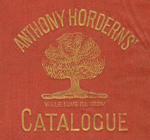
"While I live, I'll grow." Anthony Hordern & Sons was Australia's largest retailer from the late 19th through to the mid-20th century.
I originally held onto the dictionary as I went through a period of reading historical fiction. Some of the words weren’t in a regular dictionary and I had no idea what they meant. Google hadn’t been born yet, so without the Messrs Hordern I would have been in the dark. The reason why it now has a place on my desk? I find it inspirational. It’s not just for thinking outside of the box, but for thinking before the time period my box lives in. I love original words and titles. Old dictionaries are a great place to find them. Not to mention, if I ever come across a Bishop Suffragan, I’ll know what to do.
If you write fantasy, you may want to get to know what a cartulary is. (I’m not telling… go have fun finding out, you may discover other goodies in the process.) If you write historical works, then discovering what a quaestorship is could be helpful. Oddly enough, while I am on that page, a quaich or quaigh is “a small drinking vessel with two ears for handles.” Yes, it says ears. I’d like to know whose ears? Horror writers, have fun with that one! Just don’t ask me to read your work before bed or eating.
 Many of these words are sending my spell checker into a frenzy of confusion. If you would like to give autocorrect a complete nervous breakdown and expand your horizons, have a look at Project Gutenberg’s work at http://www.gutenberg.org/ Project Gutenberg takes out of copyright works and puts them online free for anyone to read. You can get them as ebooks for Kindle, epub, .txt or .pdf. They have facilities for mobile devices. It’s worth a look. They cover humour, satire, reference, gothic fiction, military, Dante, Dracula, fiction for clergy, Danish fairy tales, erotica, ghost stories, historical works, socialism, time travel, ancient history, philosophy, poetry, detective and fantasy stories, romance… you get the picture! It’s a treasure trove for writing ideas and great reading.
Many of these words are sending my spell checker into a frenzy of confusion. If you would like to give autocorrect a complete nervous breakdown and expand your horizons, have a look at Project Gutenberg’s work at http://www.gutenberg.org/ Project Gutenberg takes out of copyright works and puts them online free for anyone to read. You can get them as ebooks for Kindle, epub, .txt or .pdf. They have facilities for mobile devices. It’s worth a look. They cover humour, satire, reference, gothic fiction, military, Dante, Dracula, fiction for clergy, Danish fairy tales, erotica, ghost stories, historical works, socialism, time travel, ancient history, philosophy, poetry, detective and fantasy stories, romance… you get the picture! It’s a treasure trove for writing ideas and great reading.
I like Anthony Horden and Sons’ motto: “While I Live, I’ll Grow.” The more you read, the more you grow and the better you write. As you add to what you know, your creativity has far more to draw on which can take you down paths you’d never discover otherwise. As you accede to the gladsome delights of these exemplary assets, may your exploration make the profundity of your literary divagation more jocose.
P.S. Don’t overdo it with the fancy words! It’s taken me twice as long to write that last sentence as it did to write the whole post… I’m still not sure the word use is correct.

This article is Copyright Cate Russell-Cole 2012. It may only be reproduced, with my permission, for non commercial purposes only. My name and Copyright must remain intact. For permission, please email me at: cate@virtual-desk.com.au
Filed under: Blogging, Creativity, Inspiration, Writing Tagged: dictionary, discovery, epub, growth, ideas, inspiration, Kindle, learning, originality, project Gutenberg, reading, resource, thinking outside the box, writer, writing













